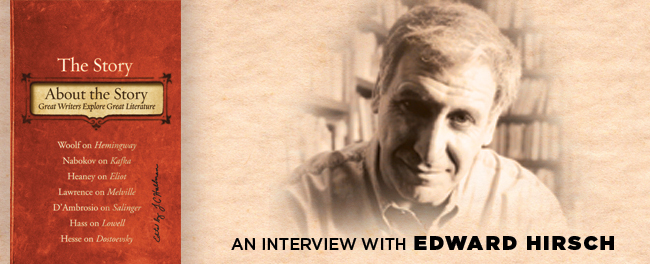J.C. Hallman continues his series of Q&A’s with Story About the Story contributors today with Edward Hirsch. In addition to more than half a dozen books of poems, Edward Hirsch is the author of several books of “creative criticism,” including How to Read a Poem, which is excerpted in The Story About the Story I. Hirsch is president of the John Simon Guggenheim Foundation, and his most recent book is The Living Fire: New and Selected Poems.
J.C. Hallman: Do creative writers have an obligation to act as critics, to offer up alternatives to traditional critical methodologies and assumptions?
Edward Hirsch: No. Creative writers have the obligation to write creatively, to do the work that they were meant to do. Sometimes that includes acting as critics, sometimes not.
JCH: As you see it, what happened to criticism? That is, how did we move from Arnold and Pater and Wilde to the kind of academic criticism produced in Literature departments?
EH: That’s a complicated path. The road goes through modernism. Matthew Arnold narrowed the definition of poetry to “a criticism of life,” but Ezra Pound later countered that “Poetry is about as much a ‘criticism of life’ as a red-hot iron is a criticism of fire.” I love the impressionistic criticism of Arnold and Pater, but there’s also a lot to be said for the polemics of Eliot and Pound, for the theoretical models offered by I. A. Richards, William Empson, and Kenneth Burke, our Coleridge. Let’s not forget that the titans of New Criticism—John Crowe Ransom, Allen Tate, and Robert Penn Warren—were all poets, and so were such vigorous critics as Yvor Winters and R. P. Blackmur. Even the neo-Aristotelian Elder Olson was a poet first of all. But the tenor of things changed dramatically with the attack on New Criticism, which was necessary and even inevitable, since the New Critics purposefully excluded historical information from their reading of poetry, the move to postmodernism, which ironized everything, and the interrogations of literature that that were introduced by French theorists and imported to America. Those theorists energized academic criticism tremendously—I myself especially adore Roland Barthes—but something went awry when the suspicious readings of literature came to dominate and even colonize academic literature departments. The best critical and theoretical writings add rooms to the house of literature; they don’t try to tear down the house completely. No one would accuse the deconstructionists of being poets…

